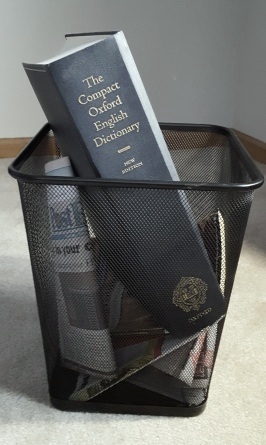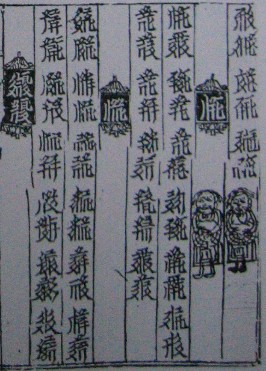 ost people know the Tower of Babel story, where God gets angry at human arrogance
for building a tower to heaven and screws us over by inventing multiple incomprehensible
languages. I have a different theory: it actually started when one of the workers
insisted that everyone else must use the pronoun
ost people know the Tower of Babel story, where God gets angry at human arrogance
for building a tower to heaven and screws us over by inventing multiple incomprehensible
languages. I have a different theory: it actually started when one of the workers
insisted that everyone else must use the pronoun xe when they talk about
him in the third person, which is to say when they're gossiping behind his back about
how doofusly incompetent he is.
The other workers, immediately realizing the irrationality of someone complaining about words that by definition he would never hear, picked him up, heaved him off the tower into the sand, threw empty beer bottles at him, and started making jokes about the size of his penis, incorporating all those different pronouns like ‘xe’, ‘xir’, and ‘xem’.

No need for this anymore
Big mistake. Before they knew what was happening, they had accidentally created a
gigantic table of new pronouns, like fae/faer/faers/faerself,
ne/nem/nir/nirs/nirself, and neb/neb/nsbself, like those being
churned out by our busybody academics today. These pronouns immediately evolved
into new languages. Suddenly none of the workers could understand the other, nor
were any of them inclined to try because in their minds everybody else's language was
ridiculously stupid.
Why can't we do this today? Every person on earth is a different sex. And also, because everyone's DNA is measurably different, every person is also a different race. Therefore, giving every person a separate language will eliminate sexism, racism, homophobia, transphobia, agoraphobia, astrapophobia, claustrophobia, and, in fact, all kinds of discrimination once and for all.
Imagine the possibilities: Google would have an excuse to implant translating chips into everyone's brain. Two-inch-thick newspapers would flourish again. Signs in airports would be miles high, as each direction was reprinted in dozens of different, mutually incomprehensible languages. And we would finally have Peace on Twitter and Goodwill Toward Person: if nobody can read anybody else's tweet, they can't mob him.
For the record, I have always said my pronouns are his holiness/his super amazing
holinessness/his frickingly awesome holinesself, since I identify as the Pope
on Sundays between 7:05 and 7:14 am, but one commenter on the Internet came up with
an even better one: “Judge, my personal pronoun is free this man
immediately, he's innocent and an outstanding person! and I demand to be
called that at every opportunity.”
Computer programmers will notice the flaw right away: the evil pronoun he,
which is sexist, racist, homophobic, colonialist, and transphobic, is still
part of the pronoun. But even worse is there's a pronoun inside a pronoun, so
it becomes recursive: “Judge, my personal pronoun is
free this man immediately, for ‘free this man immediately, he's innocent
and an outstanding person!’ is an innocent and an outstanding person!
and I demand to be called that at every opportunity.”
Unfortunately for my plan, the philosopher Ludwig Wittgenstein proved that a private language is impossible. He wrote: “I am my world.” [Tractatus 5.623]

Example of Xixia writing
No wait, wrong quote. Anyway, it's in his book Phil. Invest., which is too rambling and unquotable for me to find it. That book seems to have been written in some personal private language, as he keeps going off the topic, talking about qualia without actually getting to any actual proof. But it's obvious anyway from the definition of language as a form of communication that ‘private‘ and ‘language‘ are incompatible and contradictory.
Another point is that languages are evolving anyway to make words easier to pronounce and to mesh with how concepts are represented in the brain. So expect awkward words created for political purposes, like ‘chairperson’, to fall out of use. Chair and person just don't mesh. The image it conjures up gives no insight as to what it might mean. That's why Orwell's Newspeak never caught on.
The Chinese have the right idea. In Chinese, there are about 17,000 characters,
what we'd call icons, that constitute the roots of their language. In Mandarin every
character is either VC (vowel+consonant), V, or CV (CVC is only allowed for syllables
ending -ng, -n, or -r), so that any combination
of characters is easy to pronounce. Most of their actual words consist of two characters,
giving them 289 million possible two-syllable words.
Granted, they made a few mistakes along the way. The biggest one was to standardize their characters. This means even speakers of dialects that are mutually incomprehensible can still read what the others wrote. Another problem is that they included pitch as a lexical component, which makes it possible to encode many words using the same phonemes. Some dialects have eight or more pitches: if you say a syllable in the wrong pitch, you're saying boy instead of girl. They also have trouble with foreign words, especially Russian ones like Khrushchev, which comes out as five syllables.
We want to avoid that sort of thing, so I propose using Xixia characters, which look like they might mean something but are actually incomprehensible. They look fake, which is a definite advantage for us. More importantly, no one's using them. Also, to avoid sexism, we will not have any words for ‘boy’ or ‘girl’. Since there are now at last count 1,183,422 different sexes, that ship sailed long ago.
Which brings us to the last two rules: nobody under the age of thirty is allowed to create any new words without getting approval from the master of the language, who must be an old bearded guy who lives on top of a mountain and runs a science blog. And no pronouns are allowed. And maybe women shouldn't allowed to talk at all, just a thought.
Anyone who breaks one of those rules will be required to wear a red cape and a white lampshade on their head like the women in the Handmaid's Tail.
Oh, one more rule: no homophones, homonyms, or homographs. The language must be totally homophonophobic.
Hope this helps. As the British say, give it a go. Yes, we'll put a stop to that too.
jan 21 2020, 5:30 am
